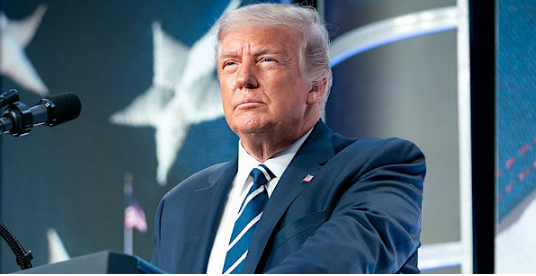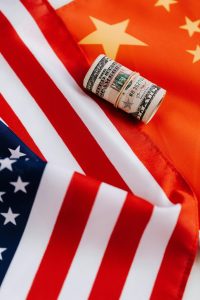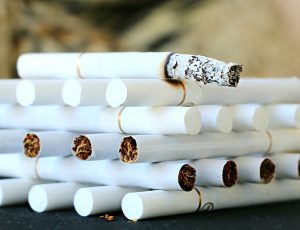With eyes on DOJ, a complex path for Trump Jan. 6 prosecution

The criminal referrals and report released by the Jan. 6 committee may not provide a clear-cut path to charges for Donald Trump. But they lay a road map for an investigative agency with the tools to compel cooperation and gather more evidence from many of those closest to the former president.
The panel’s final two acts effectively accuse Trump of betraying the country, recommending the Justice Department pursue four different criminal charges against him, while encouraging Congress to use the 14th Amendment to bar him from ever serving in office again.
And while it held back on making such recommendations for many in Trump’s orbit, its 845-page report leaves a trail of breadcrumbs on a number of plots and people involved in working to prevent the transfer of power.
“What the committee has done is to refer the former president for criminal prosecution for his role in attempting to foment a rebellion against the United States and or its system of law. That has treason written all over it,” said Jeff Robbins, an attorney who has served as both a federal prosecutor and a Senate investigative counsel.
The criminal referrals, and even the broader package of evidence laid out in the report, are merely suggestions for the Justice Department, which has its own sprawling, if less visible, investigation into what Attorney General Merrick Garland summarized as “whether any person or entity unlawfully interfered with the transfer of power.”
But the sheer weight of the evidence presented to the public, along with the detailed argument breaking down the illegality of the plots, could put pressure on a Justice Department that has often — at least publicly — lagged behind the committee.
Taken together, the committee said there was enough evidence on hand to charge Trump with inciting an insurrection, obstruction of an official proceeding, and — with his lies about winning the election and effort to submit false slates of electors — conspiracy to defraud the United States and conspiracy to make a false statement.
They stopped short, however, of making referrals for the bulk of the names that have become central figures during their 18-month probe, like Trump chief of staff Mark Meadows, a slew of Trump attorneys including Rudy Giuliani, and Jeffrey Clark, the DOJ lawyer who was prepared to initiate an investigation into Trump’s baseless claims of election fraud if the former president made him attorney general.
“This is a very delicate balancing test that the committee had to engage in, knowing this is a statement for the American people and for history, and that if they present like a machine gun, simply going after wide swaths of people at the point of making a criminal referral, that would damage their credibility,” Robbins said.
“On the other hand, they want to point out, and they did point out, that there are other people whose conduct should be investigated.” What comes next?
The report, while trailing the bombshell revelations laid out in its summer hearings, delves much deeper than the initial criminal referrals presented Monday, including offering some new details about the extent of efforts to pressure state officials to overturn the election and submit false slates of electors.
The path ahead will be determined by Special Counsel Jack Smith, who was appointed to oversee the Justice Department investigation on the Jan. 6 front as well as its probe into the handling of records at Mar-a-Lago once Trump announced his 2024 bid for the White House.
But the Justice Department has both powers and limitations the committee did not, particularly when it comes to presenting a case that can convince 12 jurors of a former president‘s guilt.
“They have tools available to them that are unavailable to the Jan. 6 committee, like search warrants to obtain phones where they can find encrypted messages, and the grand jury where they can have witnesses testify with subpoenas that actually have some teeth that can result in jail time if you refuse to testify. Or they can grant immunity and compel witness testimony,” said Barbara McQuade, a former U.S. attorney.
“They most certainly have a much more difficult task than the committee does in presenting a case.” Trump charges face legal hurdles
Any charges against Trump would have to meet a series of legal tests — including, for some of the crimes, demonstrating intent. For others, the department would have to combat defenses from Trump that he was exercising his free speech or relying on the advice of his counsel in pursuing novel legal strategies.
“I do not think that anybody can reasonably say that any of these charges against the former president — these four charges — are a slam dunk,” Robbins said.
The charges for inciting an insurrection, while among the weightiest, could also be the most difficult to prove.
“While there is a very formidable body of evidence pointing to guilt, that doesn’t mean that the former president is naked — and I’m sorry for the imagery — when it comes to a defense,” he said.
“His team will have formidable legal and factual arguments that he is essentially being charged for speech … Politicians use phrases like ‘fight like hell,’ all the time. Politicians urge their supporters to demonstrate all the time,” he said.
A 1969 Supreme Court decision protects speech other than that designed and likely to produce imminent lawless action.
McQuade, however, said the committee framing could pass that bar, focusing not just on his fiery speech directing a mob toward the Capitol, but fanning the flames once violence was underway by firing off a tweet attacking Vice President Mike Pence.
“When he wrote those words, he knew exactly what he was doing. Before President Trump issued the tweet, a White House staffer cautioned him that the statement would imply that he ‘had something to do with the events that happened at the Capitol’—but he tweeted it anyway,” the panel wrote in their report.
“The stroke of genius I thought, in the committee’s referral, was to base it on that speech, but also on the tweet that Donald Trump sent at 2:24 p.m. where he said that Mike Pence lacked ‘the courage’ to do what was right,” McQuade said, noting he sent the tweet after watching the violence unfold at the Capitol.
“I think it’s that tweet – and they frame it not as inciting an insurrection, but as assisting in an insurrection – I think that tweet probably passes that [Supreme Court] bar,” she added.
But she said the Justice Department could hit roadblocks in proving intent, an element necessary for the conspiracy charges.
“It requires that you knew what you were doing was wrong. The old George Costanza line: ‘If you believe it, it’s not a lie.’ To what extent did Donald Trump believe these things and to what extent did he know it was all just a fraud and a lie? So all of those things have to be considered by the prosecutors in a way that the committee didn’t have to deal with,” McQuade said.
But the committee stopped short of recommending seditious conspiracy charges for Trump or those in his orbit, even as DOJ has successfully pursued such charges against members of the far-right Oath Keepers militia and prepares for a similar case against members of the Proud Boys.
The panel failed to fully tease out the ties between Trump, his associates, and members of the two extremist groups, even as some confidants like Roger Stone were connected with their leaders or relied on them for security.
Also outstanding is whether the Justice Department will see fit to pursue any charges against the other Trump associates named in the report.
McQuade said the transcripts alone — some of which have been released, others of which will be released in the coming days — could be a shortcut for the department, helping them determine any outstanding witnesses they may wish to speak with or prod for more information using DOJ leverage.
But the public nature of the release could also inhibit the investigation too.
“Not only can DOJ see that witnesses said, so can the rest of the world, and so it allows people to get their stories straight to say, ‘What are the other witnesses saying about this? Oh, I better say the same thing,’” she said. Hochul deploys National Guard to Buffalo region as ‘life threatening’ storm batters area Raskin mocks Jan. 6 conspiracies: ‘This is not an Agatha Christie novel, we know exactly whodunnit’
“Or it allows Trump and others to frame their messaging in certain ways to or just to discredit some of these witnesses that they knew said damaging things about them … So there’s some downside to having all of this out there in addition to the upside that the Justice Department gets from this.”
Any action from the Justice Department could still be months away, with the agency only just beginning to get much of the information it requested the committee share.
“The department, the special counsel, and their staff are already going very slow on this. The last thing that anybody wants to do in that department, in that special counsel’s office, is to bring a prosecution of the former president and lose,” Robbins said.



